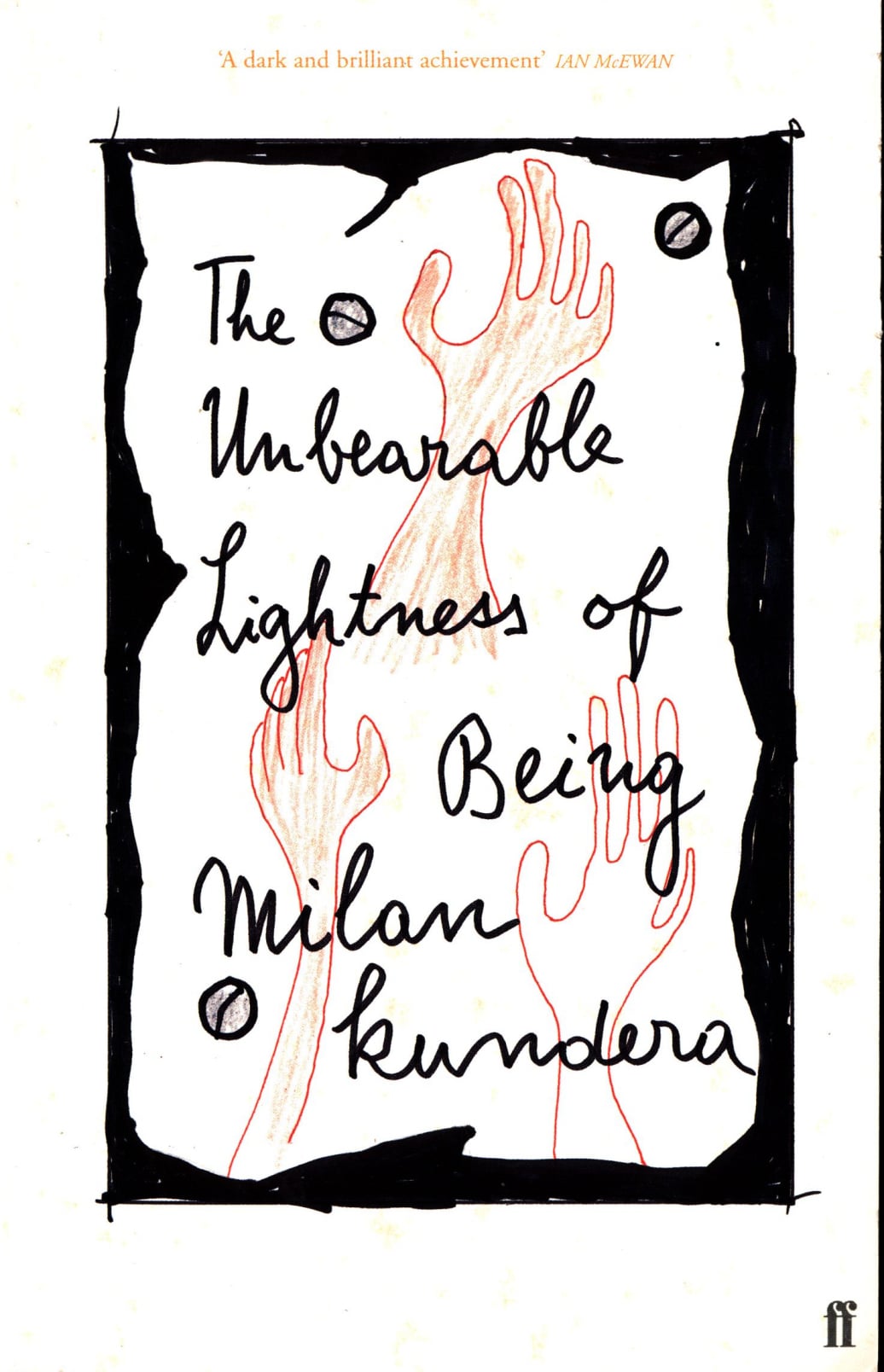
The most widely translated and published novel by Milan Kundera has been released in 47 world languages, including Flemish, Vietnamese, Armenian, and Icelandic among others. The novel was first published in France in 1984. That same year it came out in New York (Harper & Row) and London (Faber and Faber) as well as with the German publisher Fischer. A year later it was available to readers in Italy, Spain, the Spanish-speaking parts of South America, Portugal, and Brazil. Milan Kundera won the Los Angeles Book Prize for the book in 1984. Three years later he received the Chilean prize Feria chilena del libro. Květoslav Chvatík, from the afterword to the Czech edition, 1985
It would be senseless for the author to try convince the reader that his characters once actually lived. They were not born of a mother’s womb; they were born of a stimulating phrase or two or from basic situation. Tomas was born of the saying ‘Einmal ist keinmal‘. Tereza was born of the rumbling of a stomach.
Faber and Faber, 2015, p. 37

The building where Éditions Gallimard is located
(Source: Wikipedia.org, Remi Mathis, CC BY-SA 3.0)
A major French publishing house based in Paris. It was founded in 1911 by Gaston Gallimard, who ran it until his death in 1975. It was subsequently taken over by his son Claude and is currently run by Gaston's grandson Antoine. Gallimard published the first edition of his novel The Unbearable Lightness of Being in 1984. The publishing house currently has the rights to other novels by Milan Kundera. Other notable authors who have published with Galimard include Franz Kafka, Albert Camus, Marcel Proust and Antoine de Saint-Exupéry.
FOR ONCE hype and hope are justified. Milan Kundera is as exciting and as important a novelist as is claimed for him. A Czech exile and a critic of Communism, he is not a dissident in the usual sense, he is a story-teller of wit and originality, and his subject is human nature.
“It would be senseless“, he writes in this, his fifth novel, “for the author to try and convince the reader that his characters once actually lived.“ But, with this rejection of a weary convention, his characters become as real as ourselves. In the love stories of Thomas and Tereza, of Thomas and Sabina, of Sabina and Franz, he moves thoughtfully backwards and forwards in time, so that with repetition their memories become the reader´s, as the author mulls over their patterns of dependence, domination an betrayal.
This unusual love story between two worlds is rightfully ranked among the great novels of the 20th century. (...) Although Kundera’s new novel has so far been published only in French, English and German and has not yet appeared in his native language, it is one of the most important Czech novels. It is one of the most important works of contemporary European literature.
Do we have Milan Kundera to thank for a masterpiece of modern epic? No, that would be an exaggeration. But I ask as modestly as I do impatiently: when will we finally get a German novel that deals with love and sexuality just as sensitively and perceptively, and that shows the individual in the context of life here and now? A novel that is not only as intelligent and self-aware, but also as readable and entertaining.
Source: Youtube
The 1988 American film The Unbearable Lightness of Being is an adaptation of Milan Kundera’s novel of the same name. It was directed by Philip Kaufman, who also wrote the screenplay with Jean-Claude Carrière. This poetic and provocative story is set in Prague during the dramatic events of the Prague Spring of 1968. The film explores the complexities of human relationships, freedom, love, and political ideals during a period of political and personal turmoil. With its visuals, performances by actors Daniel Day-Lewis, Juliette Binoche and Lena Olin, and deep philosophical undertones, the film has won critical acclaim and several awards. The Unbearable Lightness of Being offers a unique perspective on the complicated history of Czechoslovakia while presenting a universal story about the search for personal freedom and the meaning of life.



The Milan Kundera Library is funded by the South Moravian Region and the City of Brno.
© 2024 Moravian Library in Brno